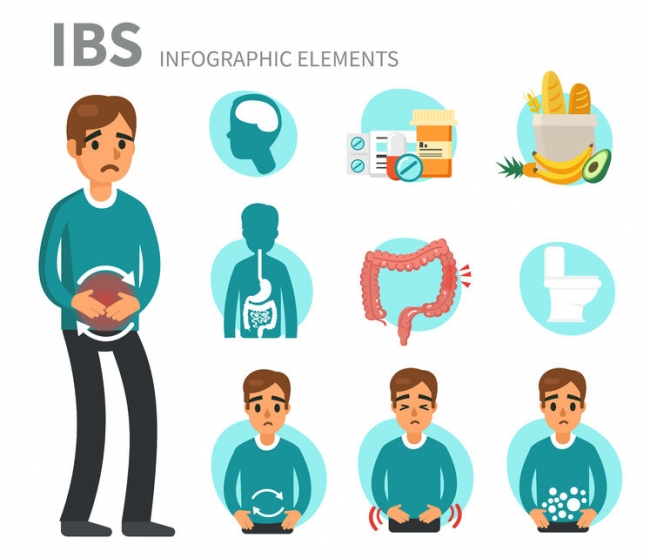Irritable Bowel Syndrome (IBS) Treatment in Romania
Search and Compare the Best Clinics and Doctors at the Lowest Prices for Irritable Bowel Syndrome (IBS) Treatment in Romania

Find the best clinics for Irritable Bowel Syndrome (IBS) Treatment in Romania
No clinics available
United Arab Emirates offers the best prices Worldwide
Price: $ 228

- Home
- Romania
WHY US?
At Medijump, we're making medical easy. You can search, compare, discuss, and book your medical all in one place. We open the door to the best medical providers worldwide, saving you time and energy along the way, and it's all for FREE, no hidden fees, and no price markups guaranteed. So what are you waiting for?

Free

Best Price

Widest Selection

Risk-Free
What you need to know about Irritable Bowel Syndrome (IBS) Treatment in Romania

Irritable bowel syndrome (IBS) is a gastrointestinal problem causing long term and persistent discomfort that affects 10% to 20% of the population. It is rarely complicated and it is not life-threatening, however, it can change the way you live your life, interfere with your ability to take part in daily activities, and make you miss work more often. While some people may be able to control their symptoms by managing stress and making lifestyle and diet changes, others may need treatment that will let them live as normally as possible.
What Does the Procedure Involve?
Your doctor will perform some tests to rule out other diseases and determine which IBS type you have, whether it is constipation-predominant, diarrhea-predominant, or mixed. Then, after confirming their diagnosis, your doctor may prescribe medications, such as Alosetron to relax your colon and slow the movement of waste through the lower bowel, Eluxadoline to ease diarrhea by reducing fluid secretion and muscle contractions in the rectum, Rifaximin to decrease bacterial growth, and Lubiprostone or Linaclotide to increase fluid secretion in your small intestine and help you pass stool.
How Long Should I Stay in Romania for a Irritable Bowel Syndrome (IBS) Treatment Procedure?
You should be able to leave Romania right away if you do not experience any symptoms. However, it is best to consult with your doctor the ideal time for you to travel home as they may schedule a follow-up appointment to see how you are responding to the medications.
What's the Recovery Time for Irritable Bowel Syndrome (IBS) Treatment Procedures in Romania?
Unless you are experiencing symptoms that interfere with your ability to perform daily activities, you usually do not need any downtime after IBS treatment.
What sort of Aftercare is Required for Irritable Bowel Syndrome (IBS) Treatment Procedures in Romania?
After the treatment, you should not forget to take the medication that was prescribed. Your doctor may also advise you to talk to a dietitian to help you make diet changes and create the best diet plan for you. It is really important to eliminate high-gas food and gluten from your diet. Besides changing your diet, make sure to exercise regularly to stimulate normal contractions of your intestines and help you to feel better.
What's the Success Rate of Irritable Bowel Syndrome (IBS) Treatment Procedures in Romania?
Treatment for irritable bowel syndrome is generally safe and effective as long as used as prescribed. The side effects and risks of the medications are nausea, diarrhea, and belly pain. In some cases, the medication may not be successful to improve symptoms.
Are there Alternatives to Irritable Bowel Syndrome (IBS) Treatment Procedures in Romania?
If you do not want to take medicine because you are not an ideal candidate for it or due to your own personal preference, you can undergo hypnosis, mindfulness training, acupuncture, or take probiotics. Always make sure to talk to your doctor before you start any of these alternatives.
What Should You Expect Before and After the Procedure
Irritable bowel syndrome can seriously disturb your day-to-day activities, preventing you from enjoying the activities you love. After treatment, the symptoms should be gone and you can live a normal life.
Whilst the information presented here has been accurately sourced and verified by a medical professional for its accuracy, it is still advised to consult with your doctor before pursuing a medical treatment at one of the listed medical providers
No Time?
Tell us what you're looking for and we'll reachout to the top clinics all at once
Enquire Now

Popular Procedures in Romania
Prices Start From $131

Prices Start From $47

Recommended Medical Centers in Romania for procedures similar to Irritable Bowel Syndrome (IBS) Treatment

- Interpreter services
- Translation service
- Religious facilities
- Medical records transfer
- Medical travel insurance
- Health insurance coordination
- TV in the room
- Safe in the room
- Phone in the room
- Private rooms for patients available

- Interpreter services
- Translation service
- Religious facilities
- Medical records transfer
- Medical travel insurance
- Health insurance coordination
- TV in the room
- Safe in the room
- Phone in the room
- Private rooms for patients available

- Interpreter services
- Translation service
- Religious facilities
- Medical records transfer
- Medical travel insurance
- Health insurance coordination
- TV in the room
- Safe in the room
- Phone in the room
- Private rooms for patients available

- Interpreter services
- Translation service
- Religious facilities
- Medical records transfer
- Medical travel insurance
- Health insurance coordination
- TV in the room
- Safe in the room
- Phone in the room
- Private rooms for patients available

- Interpreter services
- Translation service
- Religious facilities
- Medical records transfer
- Medical travel insurance
- Health insurance coordination
- TV in the room
- Safe in the room
- Phone in the room
- Private rooms for patients available

- Interpreter services
- Translation service
- Religious facilities
- Medical records transfer
- Medical travel insurance
- Health insurance coordination
- TV in the room
- Safe in the room
- Phone in the room
- Private rooms for patients available

- Interpreter services
- Translation service
- Religious facilities
- Medical records transfer
- Medical travel insurance
- Health insurance coordination
- TV in the room
- Safe in the room
- Phone in the room
- Private rooms for patients available

- Interpreter services
- Translation service
- Religious facilities
- Medical records transfer
- Medical travel insurance
- Health insurance coordination
- TV in the room
- Safe in the room
- Phone in the room
- Private rooms for patients available

- Interpreter services
- Translation service
- Religious facilities
- Medical records transfer
- Medical travel insurance
- Health insurance coordination
- TV in the room
- Safe in the room
- Phone in the room
- Private rooms for patients available

- Interpreter services
- Translation service
- Religious facilities
- Medical records transfer
- Medical travel insurance
- Health insurance coordination
- TV in the room
- Safe in the room
- Phone in the room
- Private rooms for patients available
Irritable Bowel Syndrome (IBS) Treatment in and around Romania
Introduction
Situated at the crossroads of Central, Eastern, and Southeastern Europe, Romania is a country of contrasts. From its medieval towns and castles, nature, and wildlife, to its rich cultural heritage and amazing food, this country continues to amaze its visitors. In recent years, Romania has become a flourishing medical tourism destination. Due to its low prices, well-trained medical staff, highly skilled doctors, and amazing medical centers, the country attracts an ever-increasing number of international medical tourists. Dental work is the number one reason medical tourists travel to this country, closely followed by cosmetic surgeries. Most medical tourists come from other European countries, such as the UK, Germany, other Western European countries, and the US.
Popular Cities and Regions in Romania
Almost every city in Romania has its fair share of amazing tourist attractions and skilled specialists. The most popular one is the capital of the country, Bucharest. This dynamic city boasts excellent museums, trendy cafes, and beautiful parks. Tourists usually flock to the Palace of Parliament, the Statue of Emperor Trajan, Cişmigiu Garden, the Romanian Athenaeum, and the Museum of the Romanian Peasant. Besides Bucharest, one of the most popular cities in the country is Brasov which is located in Transylvania; tourists usually come to this city as their base for trips to “Dracula’s castle.” The city is filled with charming medieval streets, great hiking spots, and a beautiful historic center. The second-largest city in Romania, Cluj-Napoca, is also famous for its bohemian cafes, amazing medical centers, and music festivals.
Transport in Romania
Henri Coandă International Airport is the busiest airport in Romania. It serves flights to various major cities in Europe, Africa, and the Middle East. Getting around Romania with domestic flights is fast, but can be expensive. The most common way to travel is by bus and maxi taxi (minibus), which reaches even the smallest towns.
Visas in Romania
While Romania is not yet part of the Schengen Area, the country’s visa policy is based on the Schengen acquis. Therefore, citizens of 62 countries, including the US and Australia, can visit and stay in the country for up to 90 days without a visa. Citizens of other countries will need a visa to enter. Those who already have a Schengen visa may enter the country.
Weather in Romania
Spring from March to May has fairly mild temperatures and pleasant weather. Summer, starting from June to August, is usually dry, sunny and sweltering. Autumn comes in September and ends in November. It brings enjoyable temperatures, but it is also the rainy season in the country. Winter, from December to February, can get quite cold and harsh with frequent snowfall.
Additional Info
- Local Currency: The currency is the Romanian leu (RON). 1 USD is approx. 4.7 RON.
- Money & Payments: ATMs can be found in major cities and smaller towns. Credit cards are widely accepted in restaurants and hotels. Tipping is expected in restaurants, hotels, etc.
- Local Language: There are several spoken languages in Romania. However, Romanian is the most spoken language. English is also spoken by around 31% of the population.
- Local Culture and Religion: Romania is a secular state with no state religion. However, Christianity is the biggest religion. Islam, Paganism, and other religions are also present.
- Public Holidays: New Year’s Day, Descent of the Holy Spirit, National Day, and Christmas Day are some of the most celebrated public holidays.
Popular Searches
- Plastic Surgery in Thailand
- Dental Implants in Thailand
- Hair Transplant in Thailand
- Breast Augmentation Thailand
- Gastric Sleeve in Thailand
- Gender Reassignment Surgery in Thailand
- Laser Hair Removal in Bangkok
- Botox in Bangkok
- Dermatology in Bangkok
- Breast Augmentation in Bangkok
- Coolsculpting in Bangkok
- Veneers in Turkey
- Hair Transplant in Turkey
- Rhinoplasty in Turkey
- Stem Cell Therapy in Mexico
- Rhinoplasty in Mexico
- Liposuction in Mexico
- Coolsculpting in Tijuana
- Rhinoplasty in Korea
- Scar Removal in Korea
- Gastric Sleeve in Turkey
- Bone Marrow Transplant in India
- Invisalign in Malaysia
- Plastic Surgery in the Dominican Republic
- Tummy Tuck in the Dominican Republic
- Plastic and Cosmetic Surgery in Poland
- Rhinoplasty in Poland
- Hair Implant in Poland
- Dental Implants in Poland
- IVF in Turkey